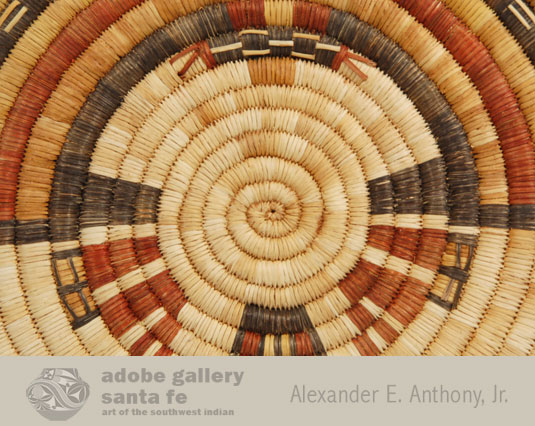Hopi Second Mesa Coiled Plaque with Katsina Design [SOLD]
+ Add to my watchlist Forward to Friend
- Category: Bowls and Other Forms
- Origin: Hopi Pueblo, Hopituh Shi-nu-mu
- Medium: grasses, yucca, dyes
- Size: 12-⅜” diameter
- Item # C4042A SOLD
The Hopi people have been living on remote mesas in Northeastern Arizona for more than a thousand years. The village of Old Oraibi on Third Mesa has been continuously occupied since about AD 1150. Today Hopis live in twelve villages on three mesas. While participating completely in modern, contemporary society, they continue to practice religious and ceremonial activities in a similar manner as their ancestors did hundreds of years ago. One of the ways the Hopi have preserved traditions is through making baskets. The creation and exchange of baskets continues to be an integral part of Hopi social and ceremonial practice. Within Hopi society, baskets are given to young women as gifts and they are exchanged by neighbors as personal expressions of hope for prosperity and fertility. They are used to carry and hold objects for ceremonies held to insure the blessings of the village.
Encouraged by early traders on the Hopi reservation who recognized the beauty of Hopi baskets, women began weaving for outside sales. It proved to be a profitable economic enterprise. Today, baskets are woven for both personal and outside use. Regardless of the intended purpose, all baskets are made with the same care and carry the same significance.
The baskets woven on Hopi’s Second Mesa are coiled. Bundles of galleta grass are wrapped with dyed strips of yucca to form coils. The coils are connected to each other in a complicated process of joining the previous coil to the current one by using an awl to punch through and connect the coils.
The arduous, time consuming process required to make a coiled basket makes this piece especially collectible. The Salako Katsina is depicted on this plaque. The artist has used a charming combination of brown, rust and yellow dyes with painstaking precision to create the image within the coils. It is expertly woven, with even, tight stitches throughout.
Condition: The basket is in excellent condition, with no missing stitches or damage.
Provenance: From a Texas collector who spent a lot of time on the Hopi Mesas
Recommended Reading: Hopi Basket Weaving: Artistry in Natural Fibers by Helga Teiwes

- Category: Bowls and Other Forms
- Origin: Hopi Pueblo, Hopituh Shi-nu-mu
- Medium: grasses, yucca, dyes
- Size: 12-⅜” diameter
- Item # C4042A SOLD



